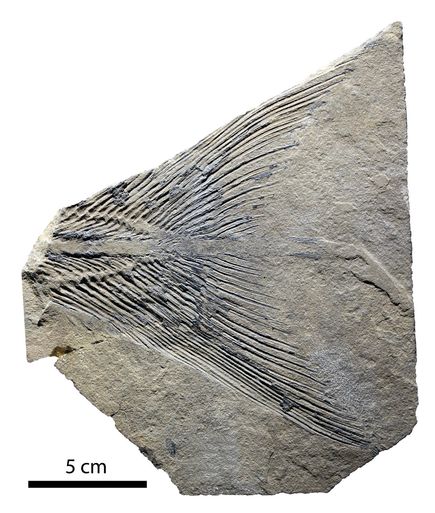 |
| The 240 million year old fossil of Rebellatrix, a 240 million year old predatory coelacanth from British Columbia |
When the creature finally arrived, it was examined by experts. They came to one conclusion: this fish, which was named Latimeria chalumnae, was a living fossil, a modern day member of a group of ancient marine organisms known as coelacanths.
Since 1938, more coelacanths have been discovered in small, isolated locations across the world. While they are bizarre remnants of a more primitive time in Earth's history, they reveal many things about the origins of terrestrial organisms. Their fins have a structure which is similar to legs and feet, and a respiratory system which hints at the origins of air-breathing lungs.
 |
| Rebellatrix's pointed, streamlined tail, a hallmark of an aquatic predator |
They have also shown that the group has barely changed in 416 million years. However recent discoveries have shown that divergent groups were different. Most coelacanths are fleshy, cumbersome bottom feeders. Yet Andrew Wendruff, from the University of Alberta, has found 240 million year old fossils of these fish near Tumbler Ridge in the Rocky mountains in British Columbia which show a rather different lifestyle.
'Our coelacanth had a forked tail, indicating it was a fast-moving, aggressive predator, which is very different from the shape and movement of all other coelacanths in the fossil record.' While coelacanths are all predators, creatures such as Latimeria and their fossil counterparts probably lay in wait for their prey. This creature was an active hunter. What is rather interesting is its evolutionary history: 50 million years ago, the Earth suffered the most cataclysmic extinction event in its history. 97% of marine life became extinct.
It is likely that this fish, named Rebellatrix which means rebel coelacanth, evolved to fill an evolutionary niche left by the giant predators of the Permian. However a lack of descendants either in the fossil record or the modern day oceans shows that it was not very successful. 'Rebellatrix was most likely a spectacular failure in the evolution of cruising predation' said Wendruff. 'Clearly some other fish groups with forked-tails must have out-performed this coelacanth as it does not appear later in the fossil record.'